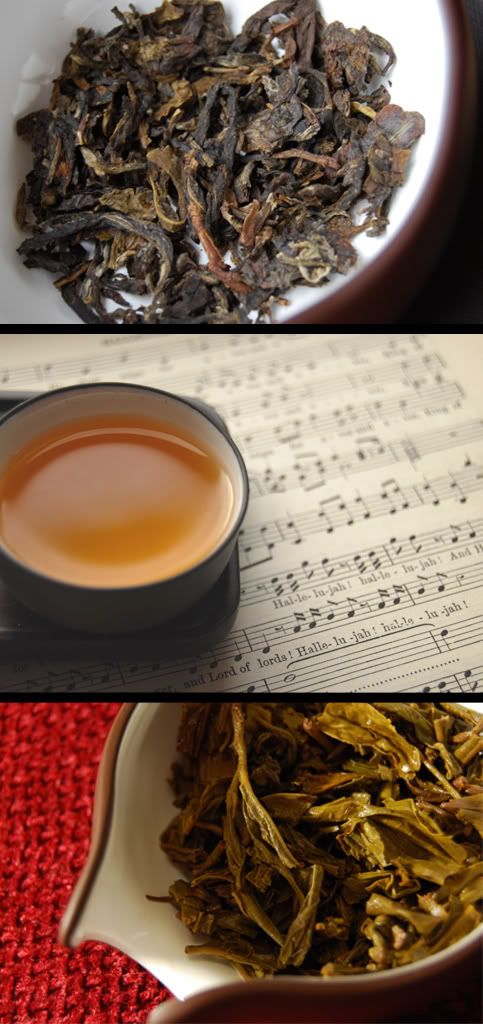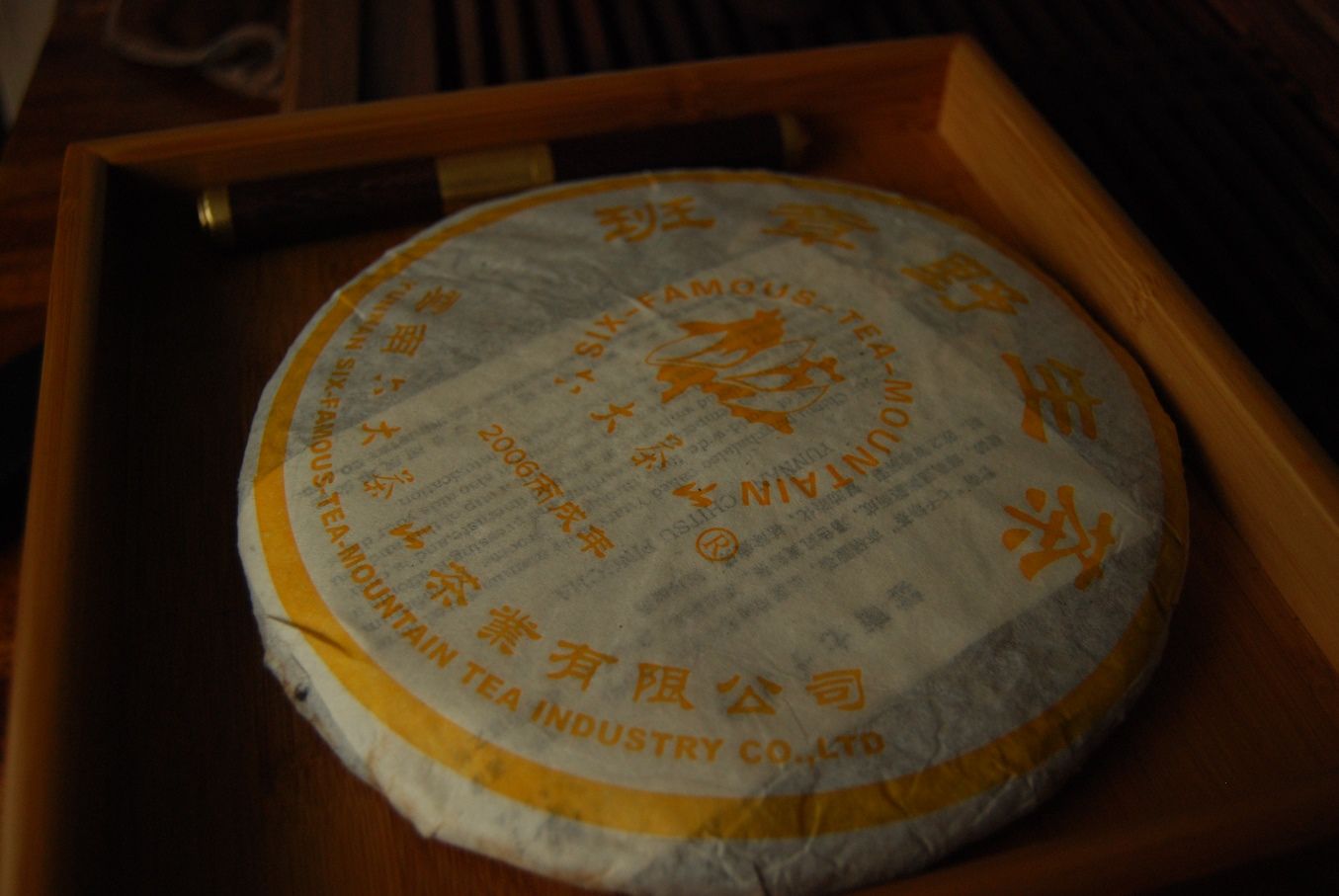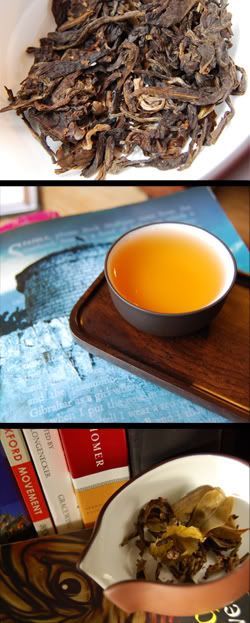Would you credit it - just as was saying how disappointing CNNP, 6FTM and Xiaguan have been of late, I come across the 2004 CNNP Yiwu, the 2006 6FTM Banzhang, and now a pleasant modern Xiaguan in as many days...
This tea turned up as a mystery addition in a recent order from Yunnan Sourcing (thanks, Scott). "Hmm", thought I; "2007 Xiaguan. I bet this tastes rough."
The leaves are highly compressed as only Xiaguan can manage. If the new European particle accelerators don't crack nuclear fusion, they should try asking the Xiaguan tea compressors for hints. I brusquely prized apart a few sections into small chunks, with no hope of separating them into individual leaves, lest they break too much.
But wait - what light from yonder window shines? This tea actually smells really very pleasant: sweet leather, as is my favourite. Can it be that Xiaguan have stumbled onto something fine?
The aroma in the wenxiangbei further draws me in, being a characteristically unique caramel.
The tea is thick, energetic, and plentifully sweet, yet tangy, and ending in that wonderful sweet-leather yunxiang. The huigan is big (big!) and leaves the mouth watering. What a pleasant surprise!
All is later revealed in an e-mail from Scott. This is apparently an "FT" [Fei Tai Co.] bing, and so made to the specification of discerning (some would say gangster) clientele, essentially just using the Xiaguan processing system. It would be like calling the 2007 Xizihao teas "Mengyang Guoyan", for the same reason. Scott notes that the leaves were obtained from Wuliangshan [a Simao mountain] and Baoshan [near the Burmese border]. This rather clears up the mystery about Xiaguan suddenly making good bingcha.
Given that this cake is only £15 [$30], which is 200 RMB, I don't think I could hope for a whole lot better from Maliandao, especially given my fairly lackluster bargaining skills (to which I confess that I don't have the heart to spend such energy bartering, especially given how hard a time some of those vendors have).
I like this tea, very much! It's "division two", but it's tasty, and easily worth £15. It looks as if "FT" know what they're doing. Just don't borrow money from them (ho ho).
This tea turned up as a mystery addition in a recent order from Yunnan Sourcing (thanks, Scott). "Hmm", thought I; "2007 Xiaguan. I bet this tastes rough."
The leaves are highly compressed as only Xiaguan can manage. If the new European particle accelerators don't crack nuclear fusion, they should try asking the Xiaguan tea compressors for hints. I brusquely prized apart a few sections into small chunks, with no hope of separating them into individual leaves, lest they break too much.
But wait - what light from yonder window shines? This tea actually smells really very pleasant: sweet leather, as is my favourite. Can it be that Xiaguan have stumbled onto something fine?
The aroma in the wenxiangbei further draws me in, being a characteristically unique caramel.
The tea is thick, energetic, and plentifully sweet, yet tangy, and ending in that wonderful sweet-leather yunxiang. The huigan is big (big!) and leaves the mouth watering. What a pleasant surprise!
All is later revealed in an e-mail from Scott. This is apparently an "FT" [Fei Tai Co.] bing, and so made to the specification of discerning (some would say gangster) clientele, essentially just using the Xiaguan processing system. It would be like calling the 2007 Xizihao teas "Mengyang Guoyan", for the same reason. Scott notes that the leaves were obtained from Wuliangshan [a Simao mountain] and Baoshan [near the Burmese border]. This rather clears up the mystery about Xiaguan suddenly making good bingcha.
Given that this cake is only £15 [$30], which is 200 RMB, I don't think I could hope for a whole lot better from Maliandao, especially given my fairly lackluster bargaining skills (to which I confess that I don't have the heart to spend such energy bartering, especially given how hard a time some of those vendors have).
I like this tea, very much! It's "division two", but it's tasty, and easily worth £15. It looks as if "FT" know what they're doing. Just don't borrow money from them (ho ho).
Addendum
August, 2013
Bargain sensors on stand-by: this $30 is currently selling for $36, six years later. As pictured above, it is watched over by the family Buddha...
The small, broken leaves are distinctly Xiaguan. They originate from Wuliangshan in Simao diqu (one of my favourites) and Baoshan diqu. The latter is rather unusual as far as pu'ercha goes - certainly very few cakes attribute their maocha directly to this region. I suspect that it is more commonly used by Xiaguan, who are based far north, in Dali.
The soup is now a fairly cloudy orange - it is good to see that change has occurred in six years. The flavour has settled into a rich, low affair, while the kuwei [good bitterness] is slowly transforming into aged sweetness.
While most Xiaguan cakes are super-ordinary, and unashamedly so (which is why I love them), the "FT" brand is nominally a little more up-market. This is obvious in the #4 ("Sihao" on the wrapper), which is quite strong, and has a sweetness that is piercing - much moreso than standard Xiaguan.
Is it a super bargain? Is it worth buying more? Maybe it would be worth seeing how other cakes have got on. I am happy with those that I have bought, but probably don't need to try and squeeze any more onto our shelves, given existing quantities. If you're building up a collection, you might wish to give this one a try - dependent on storage.
Is it a super bargain? Is it worth buying more? Maybe it would be worth seeing how other cakes have got on. I am happy with those that I have bought, but probably don't need to try and squeeze any more onto our shelves, given existing quantities. If you're building up a collection, you might wish to give this one a try - dependent on storage.














